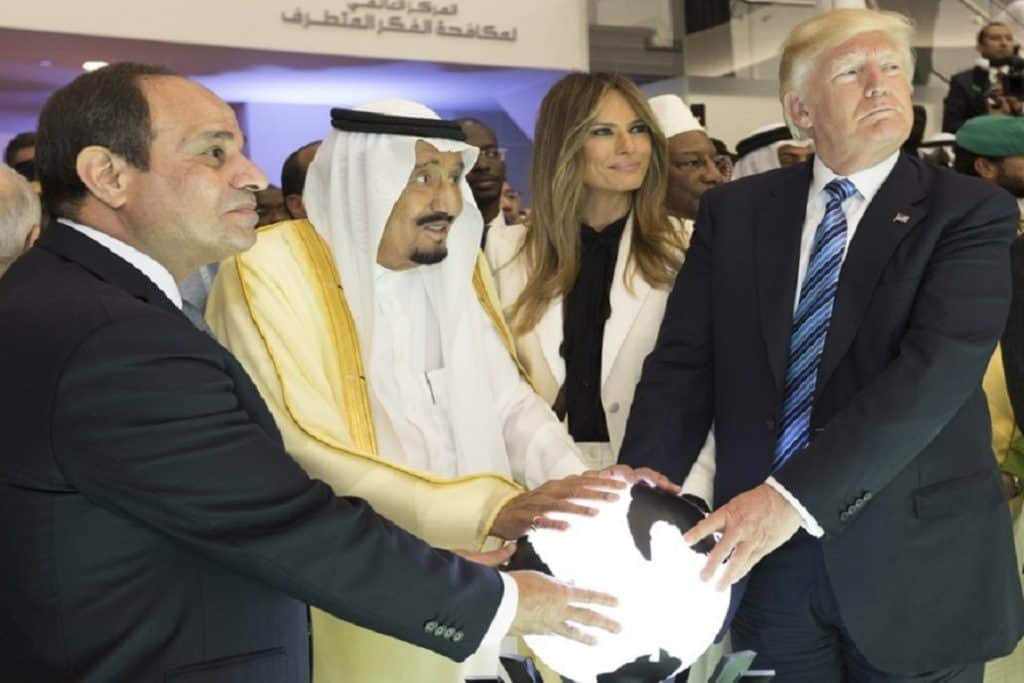By Amr Mohammed Eldeeb
In his speech at the Arab-American Islamic Summit, held in Riyadh in May 2017, US President Donald Trump supported the idea of creating an Arab Sunni alliance to counter Iranian aggression and fight extremism. The alliance may include, as expected, Saudi Arabia, the United Arab Emirates, Jordan, Egypt and other Sunni countries.
To create such an alliance is not an innovative idea, but an old “American dream”. During the Cold War, the United States used Turkey, and now Saudi Arabia to complete its plan to create an Arab-Islamic military alliance, but this time against the Iranian threat.
Arab NATO needs the United States to reduce the US military budget allocated to the Middle East: Saudi Arabia and the Gulf countries in the framework of the alliance will have the highest military spending, as well as buy weapons from the United States, which will increase Washington’s coffers and lead the arms market: At the same summit between the United States and Saudi Arabia, an agreement was signed on the supply of arms – the largest in world history.
US politicians believe that creating a Middle Eastern alliance will be cheaper than creating defense systems for each individual country. In addition, such an alliance gives the United States more control over the region: controlling a single alliance of countries is easier and more effective than controlling each of the 20 countries. The formation of a Middle Eastern alliance will also give Israel a historic opportunity to strengthen its relations with Arab states headed by Saudi Arabia, with which Israel has a common enemy – Iran.
However, the chances for a real alliance creation are not great. The existence of an Arab military alliance at the request of the United States is almost impossible. The Arab countries of the Persian Gulf will not be able to create a strong military alliance without the participation of Egypt, which since 1950 has refused to join any alliance sponsored by the West.
The principle of Egypt and its crucial importance are evident in every attempt by the West to form an alliance over the past 68 years. Only once did Egypt take part in the Islamic military alliance: due to the Iraqi occupation of Kuwait in 1990. This is the only time that the Arab-American alliance has been successful and has achieved its goals. Egypt will not intervene in any geographically remote military conflicts unless there is a real danger.
However, Egypt is ready to enter into an air-sea conflict with Iran near the Bab-el-Mandeb strait in case of a threat to maritime navigation in the Suez Canal. Theoretically, Egypt will enter the expected military alliance, but in fact Egypt will not intervene far from its land and from the Red Sea.
A part the Egypt’s refusal to participate in US-sponsored alliances, there are serious disagreements between Saudi Arabia and Qatar, which resulted in the establishment of a Turkish military base in Qatar, which makes it difficult to form an alliance against Iran. In addition to the differences between Saudi Arabia and Qatar. There are also differences between Saudi Arabia and the United Arab Emirates over the Yemeni conflict.
No less important reason for the failure of attempts to create an alliance in the Middle East in the strategy followed by Saudi Arabia. In its actions, Riyadh relies on bribery, political threats and sanctions: we have already seen the suspension of oil supplies to Egypt by Saudi Arabia in October 2016 and the severance of diplomatic relations with Qatar in June 2017, as well as the blockade of Qatar together with the UAE, Bahrain and Egypt and the detention of Lebanese Prime Minister Saad Hariri in November 2017 in Riyadh.
No military alliance can only keep on a common goal – there are always differences in capabilities, strategies and levels of participation. Combining different countries into one system, especially of a military nature, requires political coordination, military training, mutual respect and a political strategy that defines allies and enemies, as well as a military strategy that sets priorities for the theater of operations and plans. This is what was lacking in the old and new military alliances of the West in BV.
(The opinions expressed in this article are solely those of the author and do not necessarily reflect the views of World Geostrategic Insights).







